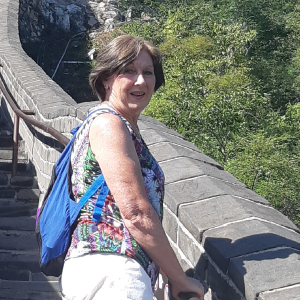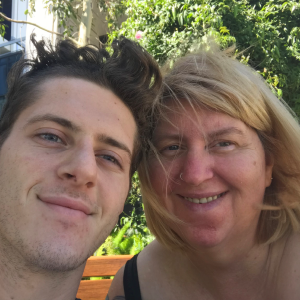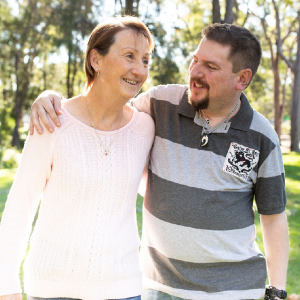Stories from our Community
This Brain Injury Awareness Week (17-23 August) our theme is ‘Welcome to our World’: social isolation after brain injury.
This year most of the world is experiencing what it is to be socially isolated, which is something that people with brain injury often experience. We asked the members of our Reconnections support groups to share with us their experiences with social isolation and what they did about it.
Narelle
My son had a motor vehicle accident 10 years ago – and it didn’t take long for his friends to back away – I must admit that looking back on it, my friends backed off too. It is very isolating. You spend all of your time caring for your loved one, and before you know it – you realise that you are alone!
It has been difficult during COVID – even the few activities we could once do are now banned. The frustration on top of the isolation is sometimes more than we can bear – but we have been through worse than this – we can do anything!!
So, if you are doing it tough – just remember – this is a walk in the park compared to what you have been through. We are all doing the best we can – that’s all you can ask for!! NEVER GIVE UP!!!
You can find out more about Narelle and Todd’s story on the iCare website
Shona
I had an accident seven years ago and I haven’t gone back to work. I volunteer but spend a lot of time on my own. When COVID hit, everyone was isolating. A bit of choice was taken away but apart from that, it was the same as I usually am.
A lot of people with brain injury tend to isolate themselves. I’ve been seeing a psychologist and come to the realisation that we isolate for various reasons, mostly because people don’t understand what’s happened to us, or we’re embarrassed.
Before my brain injury, I was in a very responsible role, I worked 70 hours a week and could multi-task. Now I can only think of one thing at a time or I lose track. My memory isn’t good and cognitively I have some issues, I sometimes struggle to find the words and feel like in a group situation that people think that I’m stupid because sometimes I can’t think of the right word, or can’t focus for too long. I’m on some brain injury groups and people say the same thing, that they feel isolated and that people don’t understand, but I think part of it is what we do to ourselves for fear of what people think of us and for fear of being awkward in a social situation.
Recently I’ve come to terms with what’s happened, and I just have to face it and try to get on with things. I’ve been volunteering at a school for three years and I’ve recently started working in an op shop as a volunteer, so I’m face-to-face with people in the shop and chatting with them. That’s helped a lot.
To deal with the tough days, I do a lot of things with my hands. Recently I’ve been sewing face masks. I also do knitting, sewing, crochet, and paint by numbers. If I do that, I can focus on something. When I’m crocheting, my focus is on that and I don’t have negative thoughts running through my head.
It’s hard to accept the changes that have happened, and that there are things you can’t do. The more time you spend on your own, the worse you feel, and it’s hard to get out of that slump. A high proportion of people with brain injuries have depression or some sort of anxiety.
Seeing a psychologist has really helped, I feel better about myself that I have for a long time. It’s been good. As long as you keep going and don’t give up, there’s something always there for you.

Robyn, Synapse Family Liaison Officer
Isolation is one of that biggest issues that carers face. They may not realise that there’s support available out there. Your own health and wellbeing often suffer. You take on too much responsibility. You stress and worry. You don’t have enough time for yourself. You just want someone to understand and someone to care.
The first Carers group that I went to was the best thing ever. I didn’t even open my mouth, I just listened and couldn’t believe that other people had gone through the same things that I’d gone through. I found out that there’s a lot of support available for Carers.
With the isolation due to coronavirus, you can be more isolated in your caring role. We’ve got online groups now, so take advantage of those. Synapse hosts Zoom chats, and Facebook chats. You can join the Carer groups, and subscribe to newsletters. You can still do professional counselling over the internet – so if you need it, get it. Don’t forget to keep doing what you enjoy if you can still do it. Catch up with your friends – if you can’t do it face to face, then do it on the phone. Talk and stay connected.
Brain Injury Info Hub – Factsheets for Family and Carers

Deb
My son was living in Adelaide and we live on the Gold Coast in Queensland. In December 2018 we got the call that Andy had been in a vehicle accident and wasn’t expected to survive. We managed to get on a flight that afternoon. Andy did survive, and spent 2 weeks in a coma in ICU, 2 weeks in the trauma unit and 5 weeks in a rehab centre. I moved to Adelaide to be with him, and hubby came when he could.
I have never felt so alone. The only people I knew were Andy, his girlfriend and her mother. I spent my days with Andy and then I would go back to his house alone. The hospital wasn’t too bad because Andy had to have a special one on one nurse, so I could chat to them. Some of the ICU nurses came to check on us when he was in the trauma ward so I got to see familiar faces. Otherwise I had no one. For 9 weeks we stumbled through the situation.
Our families didn’t fly down because they thought they would be in the way. I would have given anything for a friendly familiar face and someone to make me a cup of tea.
It was worse once he moved to rehab. The staff didn’t have the time to look after the family as well. Andy was still suffering post coma amnesia so he barely knew who I was and really didn’t care if I was there or not. It got to a point where I just cried all day and eventually a social worker told me I needed to go home as I was causing harm to myself. So I did and I suffered guilt every day.
Finally in May, Andy came home to Queensland. His injuries were declared catastrophic – 28 broken/fractured bones, both lungs collapsed, spleen damage, brain bleeds and a TBI. We were told we would have to teach him everything from scratch. He remembered how to do everything. The biggest challenge we have faced is our mental health. Both of us have PTSD, depression and anxiety. It’s been a battle to keep him alive and well as he has felt isolated from everyone.
Andy has started back at work but now I need to find out who I am.
